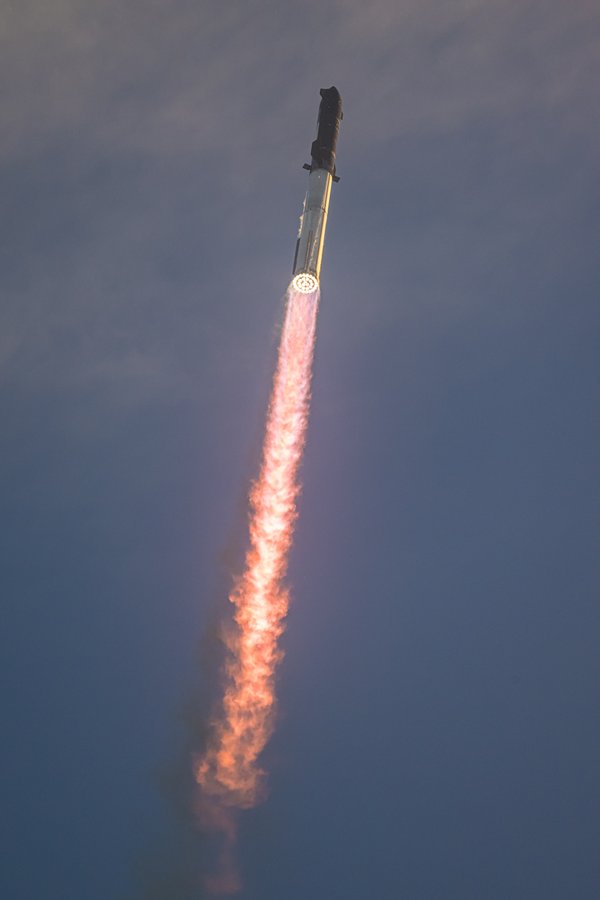#393: SpaceX Makes Progress With Second Starship Launch, & More
1. SpaceX Makes Progress With Second Starship Launch

On Saturday, SpaceX’s second Starship launch met its primary objective, successfully separating from its first-stage booster without any engine failures. Post-separation, however, the booster exploded, and minutes later Starship seemingly responded to a self-destruct command. ARK views the success of this launch as a significant milestone and expects that SpaceX will continue to iterate Starship, much like it did the Falcon 9.
Based on back-of-the-envelope calculations, Starship is likely to play a critical role in expanding Starlink’s constellation to 42,000 satellites.[i] Given their five-year lifespans on average, SpaceX will have to launch about 8,400 satellites per year which means that, despite its enormous payload capacity, Starship will have to launch every three and a half days. Interestingly, Falcon 9 already is launching roughly once every four days.[ii] Based on its launch cadence alone, SpaceX is moving along a learning curve that should drive costs down dramatically, giving it a unique competitive advantage in the industry.

Source: https://twitter.com/johnkrausphotos/status/1725865242427609588 @johnkrausphotos
2. Microsoft Ignite Debuts OpenAI’s New Products on Azure

Last week at its Ignite conference, Microsoft not only announced that OpenAI will preview its latest model, GPT-4 Turbo, for Azure OpenAI Service customers by the end of this month but also released new Copilot products with features released at OpenAI’s DevDay on November 6th. The most notable new product was Microsoft Copilot Studio, a tool for making custom Copilots. Similar to OpenAI custom GPTs, Copilots can be tuned for use case specific tasks and easily connected to an organization’s data sitting within the Microsoft suite.
Microsoft also unveiled its own AI accelerator, Maia 100. While its LLM inferencing performance lags behind Nvidia’s H100 and H200 and AMD’s MI300X, Maia 100 could eventually help Microsoft reduce the cost of delivering its new products and is another signal of cloud providers’ focus on exploring alternatives to Nvidia’s chips. Microsoft also announced its ARM-based CPU, the Cobalt 100, which is already running internal workloads like Teams and will be made available to Azure customers next year.
3. Deep In The Mind Of Music Artists: Google’s DeepMind Presents Lyria
Last Thursday, Google DeepMind unveiled Lyria, an AI music generation model developed in partnership with YouTube. Google highlighted two experimental products built on top of Lyria: Dream Track and Music AI tools. Dream Track enables YouTube users to create soundtracks from text prompts in the style of partnered artists like Charlie Puth and T-Pain, among others. These soundtracks will serve as background music to YouTube Shorts videos, which Google hopes will catapult Dream Track as a new channel for music artists to connect with fans. For professional music artists, songwriters, and producers, Google showcased Music AI tools that generate compelling and cohesive audio output from prompt-enriched inputs such as humming, beatboxing, or MIDI files.
Based on Lyria’s published demos, we believe that Google has developed the world’s most advanced AI music model, surpassing the quality of Meta’s MusicGen and Google’s own MusicLM by far.[iii] Accommodating the current workflows of music artists, Lyria could save creators countless hours sifting through audio samples and lowering the barriers to music production dramatically.
That said, both Dream Track and the Music AI tools are likely to face copyright infringement issues. In its blogpost, Google emphasized that content published with Lyria will be watermarked with audio inaudible to the human ear. As with any other generative AI model, however, tracing the output to source materials and negotiating revenue share agreements with original artists are likely to cause some stumbles on a long, litigious journey throughout the next few years.
[i] Howell, E.; Pultarova, T; Dobrijevic, D.; Mann, A. 2023. “Starlink satellites: Everything you need to know about the controversial internet megaconstellation.” Space.com.
[ii] Robinson-Smith, W. 2023. “SpaceX Falcon 9 launches 23 Starlink satellites from Cape Canaveral.” Spaceflight Now.
[iii] One can subjectively benchmark the quality of various models on music AI competitor Jen’s website.


